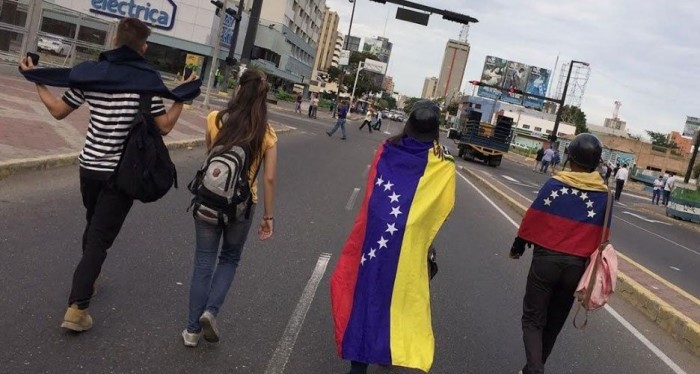Children, pregnant women and older adults are the most affected by food insecurity. Malnutrition in children under the age of five affects 1.4 million people. Many older adults rely on a monthly pension of roughly 3 US dollars, insufficient to cover their basic needs. The increase in the population that exchanges sex for food is raising alarms
Severe food insecurity among Venezuelans grew in 2023 to reach 45.2% of the population, equivalent to 13 million people. Almost half of Venezuela’s population is in a critical situation regarding access to food, according to a recent report by the organization HumVenezuela.
Although the data indicates that the availability of food grew four percentage points to reach 48.4%, -up from 44.4% in 2022-, low income prevents families from being able to afford food given the official minimum wage of less than 4 US dollars that falls short to buy a basic food basket estimated at 533 US dollars in November 2023, forcing people to look for alternatives to survive and get some food.
“Families sacrifice everything from healthcare to education in order to buy food. Approximately 75% of families spend more than 50% of their income on food. Sometimes they sell their belongings to get some money and buy certain food items, which makes them highly vulnerable to food insecurity,” explains Maritza Landaeta, researcher and expert in food habits and nutrition.
Food insecurity in numbers
91.6% of households use survival strategies to feed themselves, including cutting their spending on other goods or doing additional work.
87.6% of households have experienced a decrease in the quality and variety of their food.
86% of households do not have enough money to buy food.
83.6% cannot buy enough food due to their cost.
61.9% pay for food boxes provided by the State-run CLAP subsidized food program, although the products do not meet minimum nutritional standards.
41.1% of families combine different strategies such as sacrificing some expenses, changing their life habits or depriving themselves of food consumption.
In 13.8% of households, at least one employed member of the family is paid with food.
10.3% to 12.3% of the respondents affirm having received food from donations or handouts.
9.5% of households have at least one member who migrated to be able to afford food.
4% of the families consulted have purchased expired food.
In 3.5% of the households, more than one member has to eat outside, presumably to allow more food for the rest of the family.
1.5% of the people consulted have exchanged sex for food.
The most affected
Maritza Landaeta, a coordinator at the Bengoa Foundation and the Venezuelan Health Observatory (OVS), explains that the entire population is affected, but adds that food insecurity directly influences the quality of life of children, pregnant women and older adults. For this reason, “infant mortality has greatly increased.”
However, Venezuela lacks official figures on different health indicators since the publication of the last epidemiological bulletin in 2016. The document reported that infant mortality had risen from 19.4 to 20.23 per 1,000 live births between 2000 and 2016, an increase of 4.3%.
The ravages of greater food insecurity are evident in the cases of acute and chronic malnutrition in children under the age of five, which harms their physical growth and can affect cognitive development, Ms. Landaeta adds. 30% to 35% of the child population in Venezuela is experiencing this situation, according to studies by different organizations that compile information given the lack of national reports issued by the authorities.
HumVenezuela indicates that “malnutrition in children under the age of five continues to be a serious problem in the country, affecting 1.4 million minors who show some degree of nutritional deficiency or are at risk of experiencing it.” According to last year’s measurements, 9.5% of children have acute malnutrition and 35.4% suffer from chronic malnutrition.
The second most affected group is the elderly as most older adults rely on a monthly pension equivalent to 3 US dollars, many of whom suffer from health conditions that require medication, and the money they receive is not enough to cover food and medicine expenses.
“Sometimes older adults lack the means to lead a special diet and they have no choice but to consume the products from the CLAP food boxes, known for their little protein content, which in turn complicates their health and nutrition” Landaeta explains.
Sex for food
After the consultation carried out by HumVenezuela in 20 states of the country, 1.5% of those surveyed affirmed having exchanged sex for food.
“This is a high-risk group. Studies say that this is one of the strategies that are being used to bring home some additional money, with teenagers one of the groups most affected by this situation,” Landaeta warns.
The nutrition expert urged the authorities to remain vigilant about this situation that mainly affects minors.
Regions with the highest levels of food insecurity
The poorest states in the country are the most critical in terms of food insecurity. Landaeta mentions the states of Sucre, Delta Amacuro, Falcón, Trujillo and the indigenous areas of Zulia. Likewise, she explains that food insecurity is greater in agricultural states because “the possibility of having access to food is even more limited” and the distribution of the CLAP food boxes is more irregular in rural areas.
Without the support of humanitarian organizations, the number of people in a situation of food insecurity would be higher. Last year alone, the United Nations World Food Program (WFP) served 500,000 people in the country.
According to the Regional Overview of Food Security and Nutrition in Latin America and the Caribbean, published in January 2023 by the United Nations Food and Agriculture Organization (FAO), Venezuela registers the highest rate of undernourishment in South America with 22.9%, which means that 6.5 million people in the country suffered from hunger between 2019 and 2021.
Maritza Landaeta celebrates the support provided by humanitarian organizations in the country because “they reach the most vulnerable and help combat the lack of food,” but she recalls that the greatest responsibility lies with the Venezuelan State and cannot be assumed by NGOs.
How to solve the problem?
Landaeta explains that family income is a primary issue and as long as people’s earnings are stable and adjusted to reality, allowing people the freedom to buy their food, the situation will not improve.
In a recent interview, President Nicolás Maduro said that “there is still a lot to do [in the country]. We have worked hard to improve the comprehensive minimum income,” and he assured that people’s right to food is protected through the CLAP food program.
Maduro assured that Venezuela reached the highest level of domestic food supply of the last 25 years in 2023 with 97%, through domestic production and imports by private actors; However, the figures show that an increase in production does not mean greater consumption, while the CLAP food boxes are of erratic distribution, low quality and fail to reach the areas most in need.
Given this outlook of food insecurity, Maritza Landaeta makes some recommendations to mitigate the effects on the country’s population. The specialist highlights the responsibility of the Venezuelan State in reinforcing the School Feeding Program to guarantee children at least one or two meals a day, strengthening maternal and child care, supporting older adults, improving families’ income, creating jobs and increasing the quality of the food sold through the CLAP program.
Translated by José Rafael Medina




